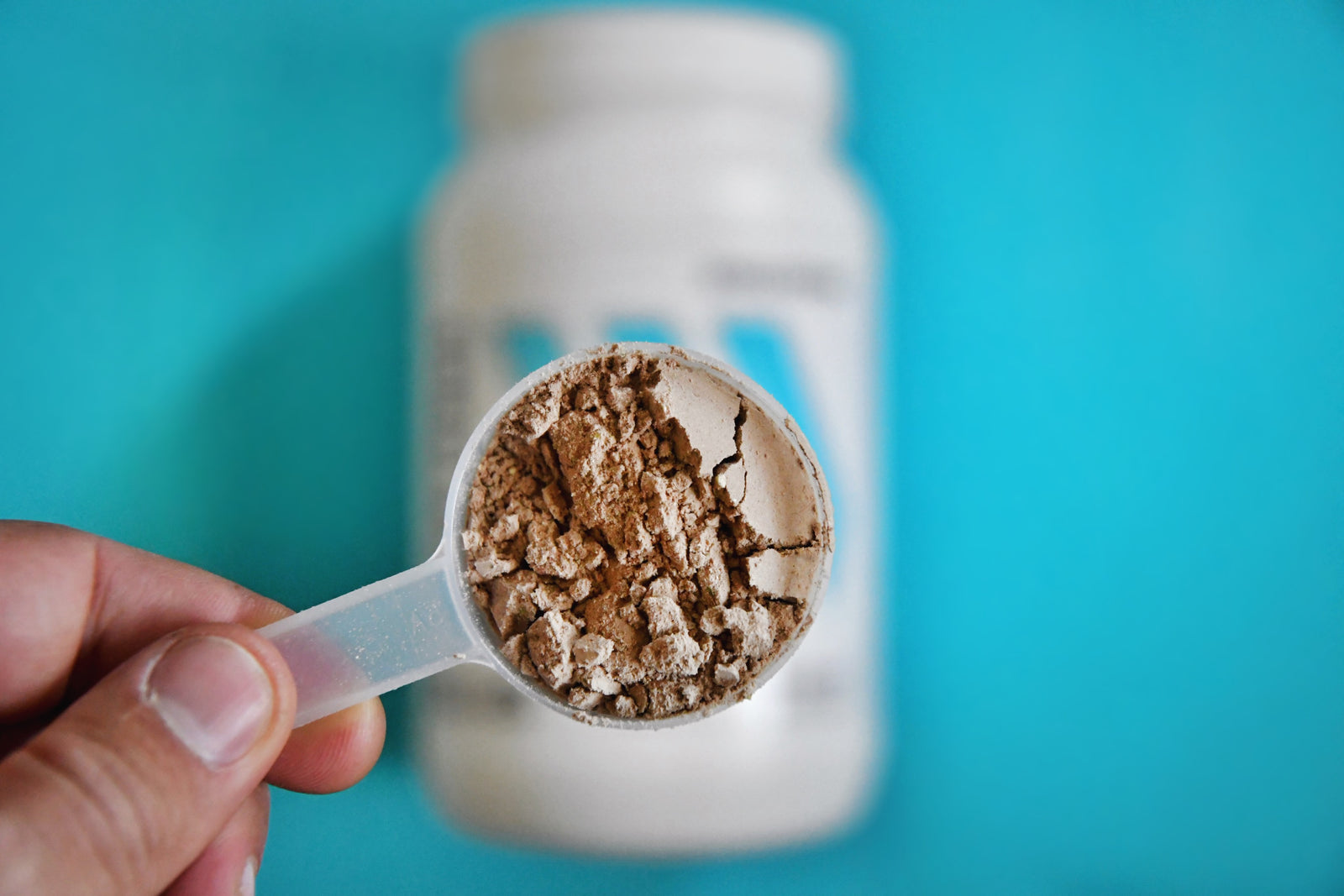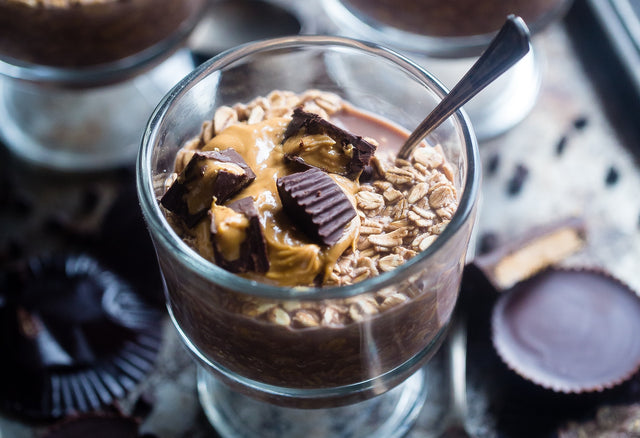Plant based alternatives are quickly becoming the next big trend in health and fitness. The biggest challenge when you’re looking for a great source of plant-based protein powder, is knowing which contains a full amino-acid profile to help deliver the protein you need for a plant-based diet. As compared to animal protein, plant protein sources are unique, as each source has different essential nutrients. We’re going to talk about the 5 best protein sources you need in a high-quality plant-based protein, so you can get the nutrients you need to power your active lifestyle.
What Is Plant Based Protein?
Plant based protein, is simply protein derived from plant sources. Plant protein can be sourced from a variety of different places, such as peas, soy, pumpkin seed, watermelon seeds, rice, chickpeas, quinoa, and hemp. The best plant based protein sources will vary from person to person and really depends on what sources you're looking for, intolerances, allergies, and micronutrient profile.
Proprietary Blend-Free
Before we get into what plant protein sources are the best to look for, it’s important to find a supplement that is transparent and tells you how much of each ingredient is in your product. Most plant-based protein powders use proprietary blends and do not disclose how much of each ingredient they use. Without knowing the amount your ingesting, you won’t know how much protein, or essential nutrients you’re really getting in your plant-based diet.
Pay attention to the supplement label and make sure the amounts for each type of protein are listed. Most protein powders will put each type of protein in the ‘other ingredients’ and do not disclose how much of each type of protein it has.
For example, if your plant protein source has, “pea protein, brown rice, quinoa, and chia” chances are your plant protein powder is made with a ratio of 9:1 pea protein, or rice. Now, let’s find out what the best plant protein sources are to help optimize your performance.
Pea Protein
Pea protein is perhaps the best plant protein source. Supplementing with a plant protein that has a full essential amino acid (EAA) profile, is critical to initiating the muscle-building process, better known as muscle protein synthesis. As compared to other plant-based protein sources, Pea protein has the highest essential amino acid mix, almost rivaling that of Whey Protein [R].
Amino acid composition in g/100 g of whey and pea protein supplements.
| Amino Acid | Whey Protein | Pea Protein |
|---|---|---|
| Alanine | 3.5 | 4.3 |
| Arginine | 2.3 | 8.7 |
| Aspartic Acid | 8.4 | 11.5 |
| Cystine | 1.7 | 1 |
| Glutamic Acid | 13.3 | 16.8 |
| Glycine | 1.4 | 4.1 |
| Histidine | 1.6 | 2.5 |
| Isoleucine | 4.6 | 4.5 |
| Leucine | 8.8 | 8.4 |
| Lysine | 7.5 | 7.2 |
| Methionine | 1.6 | 1.1 |
| Phenylalanine | 2.6 | 5.5 |
| Proline | 6.6 | 4.5 |
| Serine | 4.6 | 5.3 |
| Threonine | 4.5 | 3.9 |
| Tryptophan | 1.3 | 1 |
| Tyrosine | 2.3 | 3.8 |
| Valine | 4.4 | 5 |
In a double-blind randomized controlled study published in the Journal Of The International Society Of Sports Nutrition, pea protein went head to head against whey protein, to investigate the effects on muscle composition and strength. 161 male participants enrolled in a 12-week resistance training program and were randomized into a pea, whey, and placebo control group. The results showed a significant and greater effect on muscle composition amongst the pea protein group, with no clinical difference between groups in regard to muscle strength. Therefore, this study proves, that Pea protein, is a phenomenal plant-based protein source to help increase muscle strength and composition, to further improve athletic performance [R].
A similar study conducted at Lipscomb University in Tennesse, compare the effects of whey and pea protein supplementation in conjunction with 8-weeks of High-Intensity Functional Training (HIFT) on strength, body composition, muscle thickness, IMTP peak force, IMTP RFD, and WOD performance. The results confirmed that whey and pea proteins promote similar strength, performance, body composition, and muscular adaptations following 8-weeks of HIFT [R].
RELATED ARTICLE 5 Incredible Benefits of Pea Protein
Hemp Protein
Hemp is also a complete plant protein source containing all nine essential amino acids. In addition to a complete EAA profile, hemp is another great protein source, due to its healthy fats, fiber content, and digestibility [R]. Hemp protein powder is made from hemp seeds, which removes the oil, yet still contains 10% fat content [R]. Hemp contains an essential 3:1 balance of Omega-6 to Omega-3 fatty acids, contributing to improved heart joint, and brain health.
Additionally, Hemp protein is rich in minerals and antioxidants phosphorus, magnesium, calcium, iron, manganese, zinc, and copper. When looking for a quality plant-based protein. Hemp protein, is an excellent plant-based protein source, to derive the healthy fats and essential amino acids you need.
Pumpkin Seed Protein
The pumpkin seed, much like hemp contains nearly 60% protein and 30% fat with an abundance of essential vitamins and minerals such as potassium, magnesium, zinc, selenium, and copper [R].
Pumpkin seeds are one of the best natural sources of Magnesium. Magnesium is a critical element in helping the body regulate blood pressure, cholesterol, and blood sugar. If you can optimize your blood sugar levels, you can, therefore, minimize your risk to contracting chronic diseases such as type II diabetes, heart disease, and obesity.
Additionally, pumpkin seeds are rich in fiber, which supports better digestive health. Pumpkin seed protein is a valuable source of protein. When looking for a high-quality plant protein powder, try to find that includes pumpkin seed protein.
Sacha Inchi
Supposedly the next, “superfood’, sacha inchi is a nut native to the Amazonian jungles of South America and an amazing plant protein source. sacha inchi contains all essential amino acids making it a remarkable source of protein to help build muscle mass, strength, and improve athletic performance. Not to mention, it’s one of the most nutrient-dense nuts out there. Packed with alpha-linoleic acid (ALA), it also provides another source for healthy Omega-3 fatty acids [R].
A study published in the Journal Of Agricultural Food Chemistry found that Sacha inchi has an uncharacteristic amount of tryptophan (an essential amino acid, to balance the production of serotonin, which is involved in regulating appetite [R]. Serotonin also helps control your mood, promotes better quality sleep, and improves overall vitality. There’s a reason why sacha inchi, has been elevated to ‘super’ status.
RELATED ARTICLE 6 Incredible Benefits of Sacha Inchi
Quinoa Protein
Quinoa is a very high-quality plant protein source. With a full essential amino acid profile, quinoa is a great source of protein, to help improve athletic performance measurements, such as increasing strength, muscle mass, and optimizing body composition. Quinoa contains 7.2% leucine content to total protein. Leucine is proven to be the one branched-chain amino acid, that is responsible for initiating muscle protein synthesis the best. The more leucine, post-workout, the more muscle mass you’ll build, which translates into better athletic performance [R].
RELATED ARTICLE 9 Reasons Why Quinoa Belongs In Your Weekly Meal Prep
Best Plant Protein Sources: Takeaway
Finding a plant protein powder, that contains a mix of nutritional protein sources that offer a full essential amino acid profile, as well as additional micronutrients is crucial for a plant-based diet. Studies suggest that Pea protein is the best protein source, to help increase strength, increase muscle mass, and optimize athletic performance. However, it is essential to include other plant-based sources, to acquire healthy omega-3 fats, and nutrients like zinc and magnesium. Finally, make sure to purchase products, that provide full transparency, and disclose how much of each plant protein source, you’re actually getting.
Looking for the best plant-based protein to build more muscle, shred body fat, and improve athletic performance?
SWOLVERINE IS AN ENDURANCE ATHLETE AND ACTIVE LIFESTYLE BRAND. MADE FOR THE ELITE ATHLETE, AND THE STRONG-WILLED OUR PRODUCTS WERE DESIGNED TO FUEL YOUR ATHLETIC PERFORMANCE. WE PERFORM WHEN YOU PERFORM.
We believe that everyone can optimize not only their athletic performance but their human potential. The way we believe we can optimize performance is through transparency, clinically effective doses, and clinically proven ingredients with evidence-based outcomes. We provide the nutrients you need to power your active lifestyle.
References
Gorissen, Stefan HM et al. “Protein content and amino acid composition of commercially available plant-based protein isolates.” Amino acids vol. 50,12 (2018): 1685-1695. DOI:10.1007/s00726-018-2640-5
Babault, Nicolas et al. “Pea proteins oral supplementation promotes muscle thickness gains during resistance training: a double-blind, randomized, Placebo-controlled clinical trial vs. Whey protein.” Journal of the International Society of Sports Nutrition vol. 12,1 3. 21 Jan. 2015, doi:10.1186/s12970-014-0064-5
Banaszek, Amy et al. “The Effects of Whey vs. Pea Protein on Physical Adaptations Following 8-Weeks of High-Intensity Functional Training (HIFT): A Pilot Study.” Sports (Basel, Switzerland) vol. 7,1 12. 4 Jan. 2019, DOI:10.3390/sports7010012
House JD, Neufeld J, Leson G. Evaluating the quality of protein from hemp seed (Cannabis sativa L.) products through the use of the protein digestibility-corrected amino acid score method. J Agric Food Chem. 2010;58(22):11801-7.
Glew RH, Glew RS, Chuang LT, et al. Amino acid, mineral and fatty acid content of pumpkin seeds (Cucurbita spp) and Cyperus esculentus nuts in the Republic of Niger. Plant Foods Hum Nutr. 2006;61(2):51-6.
Pihlanto A, Mattila P, Mäkinen S, Pajari AM. Bioactivities of alternative protein sources and their potential health benefits. Food Funct. 2017;8(10):3443-3458
Sathe SK, Hamaker BR, Sze-tao KW, Venkatachalam M. Isolation, purification, and biochemical characterization of a novel water-soluble protein from Inca peanut (Plukenetia Volubilis L.). J Agric Food Chem. 2002;50(17):4906-8.
Gonzales, Gustavo F et al. “Nitrogen balance after a single oral consumption of sacha inchi (Plukenetia volúbilis L.) protein compared to soy protein: a randomized study in humans.” Toxicology mechanisms and methods vol. 28,2 (2018): 140-147. DOI:10.1080/15376516.2017.1373880
Van Vliet S, Burd NA, Van loon LJ. The Skeletal Muscle Anabolic Response to Plant- versus Animal-Based Protein Consumption. J Nutr. 2015;145(9):1981-91.















